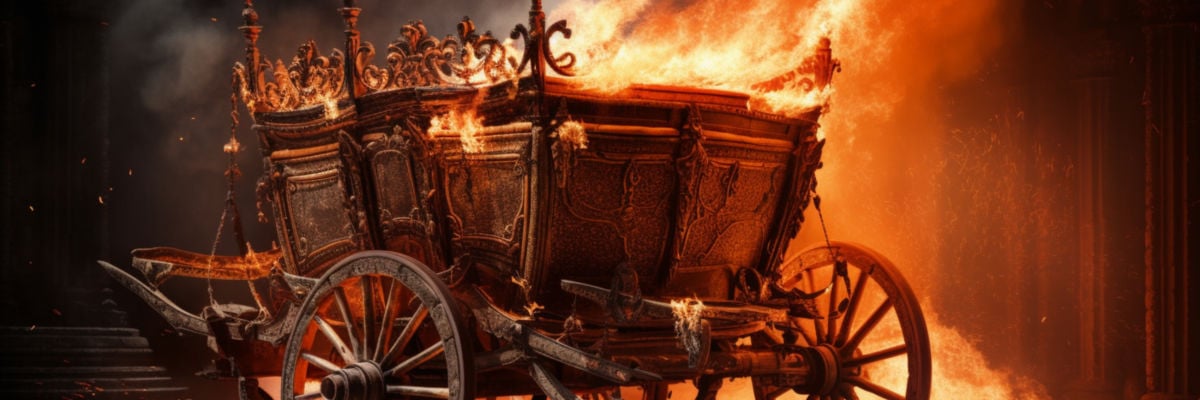
Looking back on my days as a Protestant, it occurs to me that we were comfortable with two types of authority. The first was the Bible. Although I never belonged to a tradition that placed much if any emphasis on sola scriptura, we maintained an underlying principle that things in the Bible were true. Moses really parted the waters of the Red Sea, so we knew that highly improbable natural events could occur. The Israelites really brought down the walls of Jericho with their horns and marching, and therefore miraculous victories were known to happen. Obviously, Jesus really did rise from the dead, thus we believed we would be resurrected, too.
There was also a second type of authority that my Protestant community of origin trusted—at least for the most part: personal testimony. If a missionary on furlough from his ministry in Africa came to visit our community and told us he saw a man die and get filled with embalming fluid, but the next day, the man woke up giving thanks to God, we believed him. Weird stuff like that happened in the Bible, right? If a woman stood up in a prayer meeting to say her daughter’s cancer had mysteriously disappeared from her body, of course we all rejoiced with her. We had no need to meet her daughter in person, let alone look at the girl’s pathology report. Again, thanks to Scripture, we knew that miracles were real.
Oddly, however, the Protestant world I grew up in did not hold Tradition in the same high esteem as a source of authority, akin to the Bible or personal testimony. I say oddly, because Tradition both is connected to the big picture of biblical truth and is a more reliable form of testimony than what people I knew took for granted as true.
A great test case for my point is the dogma that the Church celebrates today as a solemnity and a holy day of obligation: the Assumption of the Blessed Virgin Mary.
Now, many things we know about Our Lady come straight from the Bible. She conceived Jesus by the Holy Spirit (Luke 1:31-34); she bore Our Lord in Joseph’s ancestral home city of Bethlehem (Matt. 2:1, Luke 2:4-7); she asked her son to help the wedding guests at Cana (John 2:3); and she was taken into the home of Jesus’s beloved disciple, John, when Our Lord was dying on the cross (v. 27). Both Catholic and Protestants, taking the Bible as authoritative, accept all these stories as true. In other cases, like the perpetual virginity of Mary, all Catholics and some Protestants believe, but some Protestants dissent on the basis of a different scriptural interpretation.
All but a tiny handful of Protestants, however, dismiss the Assumption. Or at the very least, they do not hold it as an essential dogma of the faith. It’s not in the Bible, so that’s that. No point in worrying about it.
But this rejection of the Assumption is, on examination, completely illogical.
Let’s think for a moment about the prophet Elijah, whose assumption is recorded in the Bible. In 2 Kings 2, after Elisha is appointed to assume Elijah’s ministry, the text says,
And as they still went on and talked, behold, a chariot of fire and horses of fire separated the two of them. And Elijah went up by a whirlwind into heaven. And Elisha saw it and he cried, “My father, my father! the chariots of Israel and its horsemen!” And he saw him no more (vv. 11-12).
Naturally, almost all faithful Catholics and Protestants believe this story because it is in the Bible. We agree on the trustworthiness of the account that Elijah was assumed into heaven, proving that any person could be thus assumed, body and soul.
Now, Mary’s assumption is not recorded in Scripture, but assumption, per se, is attested by Scripture as the sort of thing God does. God could, therefore, assume Mary’s body and soul into heaven just as he did Elijah’s . . . but would he? Scripture points to various affirmative answers.
To name just two: First, Mary is the new Eve, succeeding where our ancestral sinner failed. Whereas the first Eve lived in both bodily and spiritual harmony with heaven before her sin, the new Eve belongs in heaven by her sinlessness. Second, Mary is the recapitulation of the Ark of the Covenant, whose original contents, the Ten Commandments, came from heaven, and whose fulfilled contents, the eternal Word of God, came from heaven to earth and ascended back to heaven again. In this sense, Mary, the vessel of the Word, once again belongs in heaven—body and soul—with the resurrected body and soul of her son, Jesus.
So God could and would assume Mary into heaven. But did he?
When Pope Pius XII finally declared the Assumption a dogma in the apostolic constitution Munificentissimus Deus in 1950, he noted that the bishops of the Church offered “an almost unanimous affirmative response,” with “outstanding agreement of the Catholic prelates and the faithful” (12). Add the countless sacred images of the Assumption from many centuries, the naming of churches and holy sites through the ages, the defense of the Assumption by some of the Church’s greatest theologians from different eras, and the inclusion of the Assumption as a mystery of the holy rosary, and you’ve got one monumentally convincing testimony. Yes, we say with total confidence, God could, would, and did assume Mary, body and soul, into heaven.
Here we see how Tradition works, intimately connected to the Bible and exceeding the trustworthiness of an individual testimony at a modern-day Protestant church gathering or private prayer meeting. The Second Vatican Council’s Dogmatic Constitution on Divine Revelation puts it this way: “Sacred Tradition and Sacred Scripture form one sacred deposit of the word of God, committed to the Church” (10).
In brief, the Assumption is no assumption! Believe this great dogma of the Church in all its fullness, and celebrate it today.



